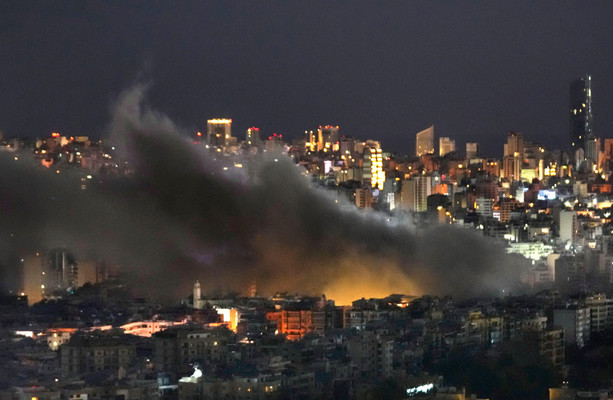Headline: Israel Strikes Southern Beirut; Netanyahu Calls Drone Attack ‘Grave Mistake’
Israel Hits Southern Beirut Amid Escalating Middle East Crisis
In a significant escalation of tensions in the Middle East, Israel launched airstrikes on southern Beirut, targeting what it claims are military installations affiliated with Hezbollah. The strikes come shortly after Israeli Prime Minister Benjamin Netanyahu characterized a drone attack on his residence as "a grave mistake," intensifying fears of further conflict in the region. This series of events unfolds against a backdrop of ongoing violence and humanitarian distress in Gaza and Lebanon, raising urgent questions about stability and peace in the area.
Israel’s Coordinated Military Response
Who: The Israeli Defense Forces (IDF) conducted the airstrikes, while Netanyahu remains at the forefront of the military response, addressing the nation and the international community.
What: The IDF targeted specific locations in southern Beirut, reportedly used as arms depots and operational bases by Hezbollah. The strikes were described as “precision attacks” aimed at minimizing civilian casualties in a region already strained by conflict.
When: The airstrikes were executed on [insert date], shortly after a drone attack, which Netanyahu described in a public statement.
Where: The targeted areas were notably in southern Beirut, a known stronghold for Hezbollah, which has been involved in numerous confrontations with Israel over the years.
Why: The escalation stems from increasing tensions in the region, particularly following the assassination of a prominent Hamas leader. The Israeli government perceives heightened threats from Iran-backed Hezbollah, and the situation has been exacerbated by the ongoing humanitarian crisis in Gaza, where recent Israeli strikes have resulted in substantial civilian casualties.
How: The operation was conducted using advanced military technology and intelligence gathered over several months. Netanyahu asserted that Israel would maintain a robust military stance to protect its citizens from ongoing threats.
The Fallout: Humanitarian Crisis in Gaza
As fighting continues, reports indicate that recent Israeli airstrikes on Gaza’s residential buildings have resulted in the deaths of at least 73 people, with many more injured. This tragic loss of life adds to an already dire humanitarian situation, exacerbating the suffering of countless individuals and families.
According to humanitarian organizations, the impact of such strikes is devastating:
- Increased Casualty Rates: The conflict has led to significant civilian deaths.
- Displacement: Thousands are forced to flee their homes, leading to a refugee crisis in the region.
- Access to Aid: Aid agencies are struggling to deliver essential supplies due to the ongoing violence.
Context and Background
The roots of the current conflict can be traced back to longstanding tensions between Israel and its neighbors, particularly regarding territorial disputes and the ongoing Palestinian struggle for statehood. The recent assassination of a key Hamas leader has acted as a catalyst for renewed violence, prompting retaliatory actions from both sides.
Expert analysts suggest that the cycle of retaliation is closely tied to the broader geopolitical dynamics involving Iran, Hezbollah, and the Palestinian groups operating in the region. Dr. [Expert Name], a political analyst specializing in Middle Eastern affairs, stated, "The situation is precarious; each act of violence pushes us closer to a broader conflict that could involve multiple players in the region."
International Reactions and Implications
The strikes and the ensuing violence have drawn criticism and concern from the international community. Nations and organizations that have historically supported diplomatic solutions are calling for restraint on all sides. The United Nations has expressed deep concern over the humanitarian situation in Gaza and Lebanon, urging countries to focus on ceasefire negotiations instead of military escalation.
US Secretary of State [Name], addressing the issue, emphasized the need for dialogue: "As the situation intensifies, we must prioritize diplomatic engagement to prevent further civilian suffering and destabilization throughout the region."
A Community in Turmoil
The impact on local communities has been profound. Families in Beirut and Gaza are fearing for their lives and livelihoods in an environment marked by uncertainty. The destruction of infrastructure and loss of life perpetuate a cycle of trauma and instability.
Grassroots organizations are mobilizing efforts to provide humanitarian assistance to affected regions. Community leaders are advocating for an immediate end to hostilities, emphasizing the need for peace and security for all civilians.
Engaging the Future
As this complex and fluid situation continues to develop, staying informed is vital. The Middle East remains a focal point for global geopolitical discussions, influencing diplomatic relations, energy markets, and humanitarian strategies worldwide.
For further updates, readers are encouraged to explore our Middle East Conflict Coverage that includes expert analysis, humanitarian updates, and ongoing news articles.
For reference, additional sources include RTÉ News, The Guardian, and The New York Times, which provide insights and reports on the ongoing developments in this multifaceted conflict.
The current situation remains tense, and public opinion is sharply divided. As the world watches, the hope for resolution hangs precariously in the balance.
Stay connected, share your thoughts below, and join the conversation about the critical developments in the Middle East.

